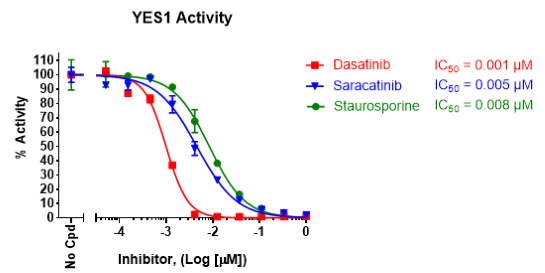Chemi-Verse™ YES1 Kinase Assay Kit
The Chemi-Verse™ YES1 Kinase Assay Kit is designed to measure YES1 (Yamaguchi sarcoma viral oncogene homolog 1) tyrosine kinase activity for screening and profiling applications using ADP-Glo™ as a detection reagent. The assay kit comes in a convenient 96-well format, with enough purified YES1, kinase substrate, ATP, and kinase assay buffer for 100 enzyme reactions.
- ADP-Glo™ Kinase Assay (Promega #V6930)
- DTT (Dithiothreitol), 1M, optional
- Microplate reader capable of reading luminescence
- Adjustable micropipettor and sterile tips
- 30°C incubator
| Catalog # | Name | Amount | Storage |
| 40488 | YES1, GST-Tag* | 10 µg | -80°C |
| 79334 | 5x Kinase Buffer 1 | 1.5 ml | -20°C |
| 79686 | 500 µM ATP | 50 µl | -20°C |
| 40217 | PTK substrate Poly(Glu:Tyr 4:1) (10 mg/ml) | 50 µl | -20°C |
| 82545 | White 96-well plate | 1 | Room Temp |
*The concentration of the protein is lot-specific and will be indicated on the tube.
YES1 (Yamaguchi sarcoma viral oncogene homolog 1), is a member of the SFK (Src family of kinase) non-receptor tyrosine kinase protein family. It is involved in cell cycle, cell proliferation, and survival. YES1 can associate with receptor tyrosine kinases such as VEGFR (vascular endothelial growth factor receptor), with G-protein coupled receptors and cytokine receptors, thus acting on multiple signaling pathways. For example, YES1 and SRC can phosphorylate the CD95 receptor, converting its role from proapoptotic to pro-survival in colorectal cancer. YES1 is an oncogene and is often overexpressed in many cancer types, including HCC (hepatocellular carcinoma), melanoma, prostate cancer, and NSCLC (non-small cell lung cancer), where it can be used as biomarker. Overexpression of YES1 has an impact on treatment with EGFR (epithelial growth factor receptor) tyrosine kinase inhibitors (TKI) and HER2-targeting drugs, by conferring resistance to treatment via YES1 gene amplification. The use of dasatinib, a multi-TKI inhibitor approved for treatment of chronic myeloid leukemia and acute lymphoblastic leukemia, proved to be able to overcome HER2-associated resistance in vivo. There are however concerns with toxicity of these pan-TKI inhibitors. As of 2022 there was only one specific YES1 inhibitor, CH6953755, being studied. The development of highly specific inhibitors for YES1 may prove beneficial in oncology.
Garmendia I., et al., 2022 Mol Cancer Ther 21(9): 1371-1380.


